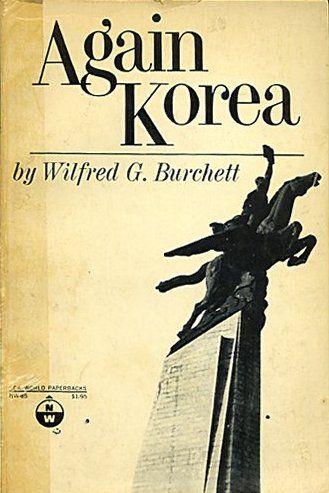110th Anniversary of the Birth of President Kim Il Sung
April 15, 1912
Kim Il Sung and Anti-Imperialist Writer Wilfred Burchett
President Kim Il Sung (1912-1994) of the Democratic People’s Republic of Korea maintained close relations with many foreign figures in his lifetime. Among them was Wilfred Burchett, an Australian anti-imperialist writer and journalist.
 In October 1975, when he met Burchett, Kim Il Sung said to him: “You have devoted nearly half your life to my country; for over 20 years you have done a great deal and rendered great service to my country.”
In October 1975, when he met Burchett, Kim Il Sung said to him: “You have devoted nearly half your life to my country; for over 20 years you have done a great deal and rendered great service to my country.”
Burchett was born to a poor family in Australia in 1911. As his family could not afford his school fee, he left school at the age of 15 and studied by himself, and later joined the Communist Party.
In 1936, he migrated to Europe, and while working as a tour guide, got employment in the Daily Express as a journalist. He worked as a correspondent in India, Myanmar (formerly Burma) and China and, during the Second World War, he wrote on battlefields in Germany and the Pacific area.
Just after the Second World War, he travelled to Hiroshima which was ruined by the U.S. atomic bomb, thus informing the world of the nuclear holocaust.
In the early 1950s he worked in China and other countries in the capacity of a special correspondent of the organs of the Australian and French Communist parties, and from August 1951, the period of the Korean war (1950-1953), he stayed in Korea. Covering the armistice talks, he wrote many articles that exposed the criminal aggression by the U.S. and gave publicity to the heroic struggle of the Korean people.
The U.S. incited the Australian authorities, also a country which fought the U.S. war in Korea under the UN flag, to try him and take away his passport. He was banished from Australia, forced to live in exile for the rest of his life.
In May 1967 he visited Korea for the second time. President Kim Il Sung praised him for his activities, and gave answers to what he wanted to know.
 Reflecting the impression he got in Korea, he wrote the book titled Again Korea, published in New York in 1968. The book consists of a prologue and 15 chapters including: Comrade Kim Il Sung, Juche, Chollima, Factories and Plains, National Reunification, Witnessing, and Under the Flag of the UN.
Reflecting the impression he got in Korea, he wrote the book titled Again Korea, published in New York in 1968. The book consists of a prologue and 15 chapters including: Comrade Kim Il Sung, Juche, Chollima, Factories and Plains, National Reunification, Witnessing, and Under the Flag of the UN.
In the book, on the chapter Comrade Kim Il Sung, Burchett introduced the revolutionary career of President Kim Il Sung, his greatness and the imperishable exploits he had performed. He wrote that the West was not well aware of Kim Il Sung and his family, stressing that each stage of development of Korea bore his sacred footprints. Noting that a study of Kim Il Sung and his family would be of great help to explaining the present policies and stands of the DPRK, he wrote in detail about his revolutionary family and the history of his revolutionary activities.
Under the subtitles Two Types of Liberation and Juche, he gave an in-depth explanation of the exploits of President Kim Il Sung, who brought into being democratic reforms for the people and founded an all-Korea state, the Democratic People’s Republic of Korea, and the Juche idea, the guiding ideology of the country.
He also wrote about the Korean people who had successfully completed post-war construction and were engaged in a momentous battle to step up socialist construction while also implementing the guidelines and policies for national reunification put forward by President Kim Il Sung. The chapters Chollima, Factories and Plains, Fruitful Orchard, and National Reunification. deal with these aspects.
In the last part of the book, Burchett exposed the brutal atrocities the imperialists committed in Korea during the Korean war, and strongly denounced the hostile forces who had unleashed a war in Vietnam and persisted in their manouevres for another war against the DPRK.
In September 1969, he attended an anti-U.S. world conference of journalists held in Pyongyang, and later he met President Kim Il Sung on several occasions. Burchett died in exile, in Sofia, Bulgaria aged 72, in 1983.
(HBRC Archives)

|

|
[BACK]

